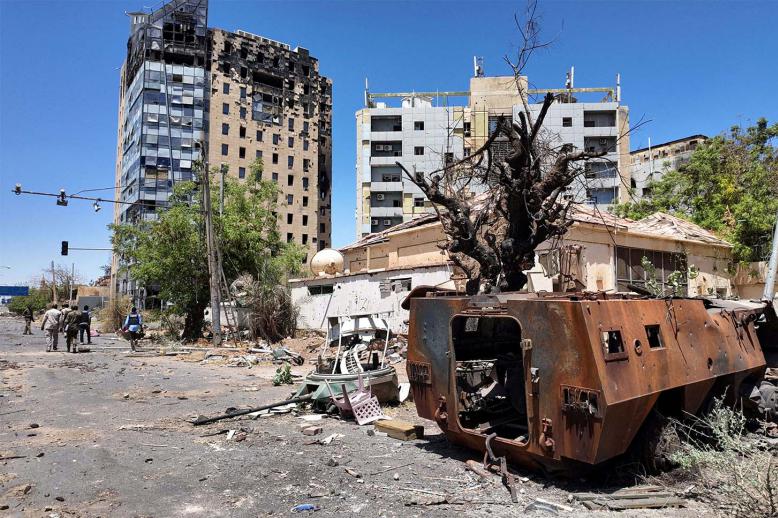Moscow offers to play peacemaker between Beirut and Damascus
Joining the reconstruction process could be a gold mine for Lebanon, with ten Lebanese companies already registered in Syria, via Syrian partners.
Tuesday 26/06/2018
BEIRUT — Lebanese and Syrian media outlets are reporting about a Russian offer to mediate between Lebanese Prime Minister Saad Hariri and Syrian President Bashar Assad, supposedly made by Russian President Vladimir Putin during Hariri’s recent visit to Moscow.
The story is half true. Senior Lebanese sources, who spoke to The Arab Weekly on condition of anonymity, said Putin “strongly advised” Hariri, whom he considers a “personal friend,” to “seriously start considering” dialogue with the Syrians.
The Assad regime was going nowhere, he said, and it was in Lebanon’s best interest to turn a page with Damascus, tackle the chronic refugee problem and join the reconstruction process in Syria, which could have enormous rewards for the Lebanese economy.
The issue of refugees remains highly problematic for Hariri. Approximately 1.5 million Syrians have been living in Lebanon since 2011, draining the already struggling Lebanese economy, especially when it came to schooling, electricity and other basic services.
The Lebanese government has milked the refugee case to death, however, using it to attract financial aid from donors across the world. With few tourists entering the country and no new investments from the Gulf, the donor money hid growing cracks in Lebanon’s economy.
For that reason, the Hariri team is not too enthusiastic about the refugees’ speedy return to Syria, unlike Hezbollah and its allies, which are pushing Lebanese officials to send them back, claiming that the fighting has stopped in their cities and towns. They fear if the refugees stay, they might marry into Lebanese society and tip the sectarian balance in favour of Muslim Sunnis.
Joining the reconstruction process could be a gold mine for Lebanon, with ten Lebanese companies already registered in Syria, via Syrian partners. Hariri knows how important this can be for the Lebanese economy and his personal empire, given that his father’s firm, Saudi Oger, rebuilt downtown Beirut after the civil war, transforming it into upscale luxury real estate.
Ironically, the Hariri firm also constructed the presidential palace in Damascus but that was a very long time ago.
Since he rose in Lebanese politics after the assassination of his father in 2005, Hariri has had a troubled relationship with Damascus. His contracts have been terminated and his home in Damascus was confiscated after Hariri accused Syria of being behind his father’s death.
In 2009, however, he visited Damascus, setting aside political differences with the Syrians — at the urging of Saudi Arabia — and declaring, from the Lebanese Embassy in Damascus, that “the skies are blue” in bilateral relations.
That visit was the brainchild of Saudi King Abdullah bin Abdulaziz Al Saud, who visited Beirut with Assad in July 2010, calming tensions in Syrian-Lebanese relations until the Syrian conflict broke out eight months later. Hariri embraced the Syrian opposition, saying he would only return to Damascus after the fall of the regime.
That clearly has not happened but Hariri cannot admit it so bluntly. He has taken baby steps that are almost invisible towards reconciliation, such as signing off on the naming of a new ambassador to Damascus in 2017 and approving the naturalisation of hundreds of Syrians, many who are accused of being close to Syrian officialdom.
Making a bolder move, such as mending broken fences with Assad, yet again, requires approval of Hariri’s allies in Saudi Arabia.
Powerful Saudi Crown Prince Mohammed bin Salman bin Abdulaziz has stepped back from his country’s previous line that “Assad must go.” In March, he admitted the Syrian president was “staying” but that he ought to distance himself from the Iranians.
If Iranian forces withdraw from Syria, along with Hezbollah troops, the Saudis would have little reason to reject a rapprochement with Damascus, especially if offered a share of the reconstruction cake. They have started courting Putin, with Saudi King Salman bin Abdulaziz Al Saud paying the Russian president a cordial visit last year, promising to work together on Syria.
Of course, if that happens, the question would be: Would Hezbollah, Iran and the Syrians be willing to turn a page with Hariri?
It hasn’t worked with Hamas, whose leaders jumped into the anti-regime camp in 2012. When realising that the regime was not falling after the Russian military intervention three years later, they tried to turn a page with the Syrians, first via Hezbollah and then through the Iranians. In both cases, they didn’t get very far.
Local Lebanese dynamics would certainly influence Hezbollah’s position on such a move — if it ever happens. If Hariri and Hezbollah are in a truce, with their government running smoothly, they would have little reason to object as well.
Can Putin take Hariri down a thorny ride to Damascus, just like King Abdullah did nine years ago? The Russian president is obviously not somebody who makes offers he cannot meet or say things he does not mean. A rapprochement is difficult — to say the least — but not impossible.
Sami Moubayed is a Syrian historian and author of Under the Black Flag (IB Tauris, 2015). He is a former Carnegie scholar and founding chairman of the Damascus History Foundation.
Copyright ©2018 The Arab Weekly







